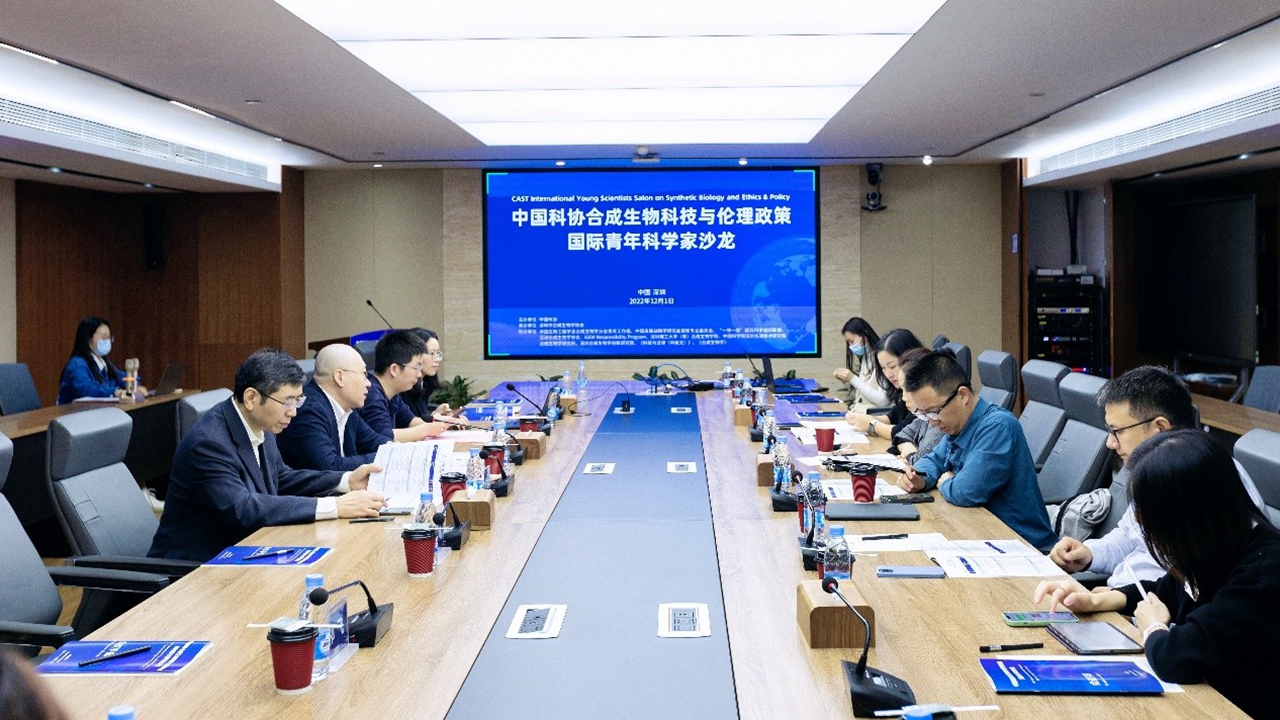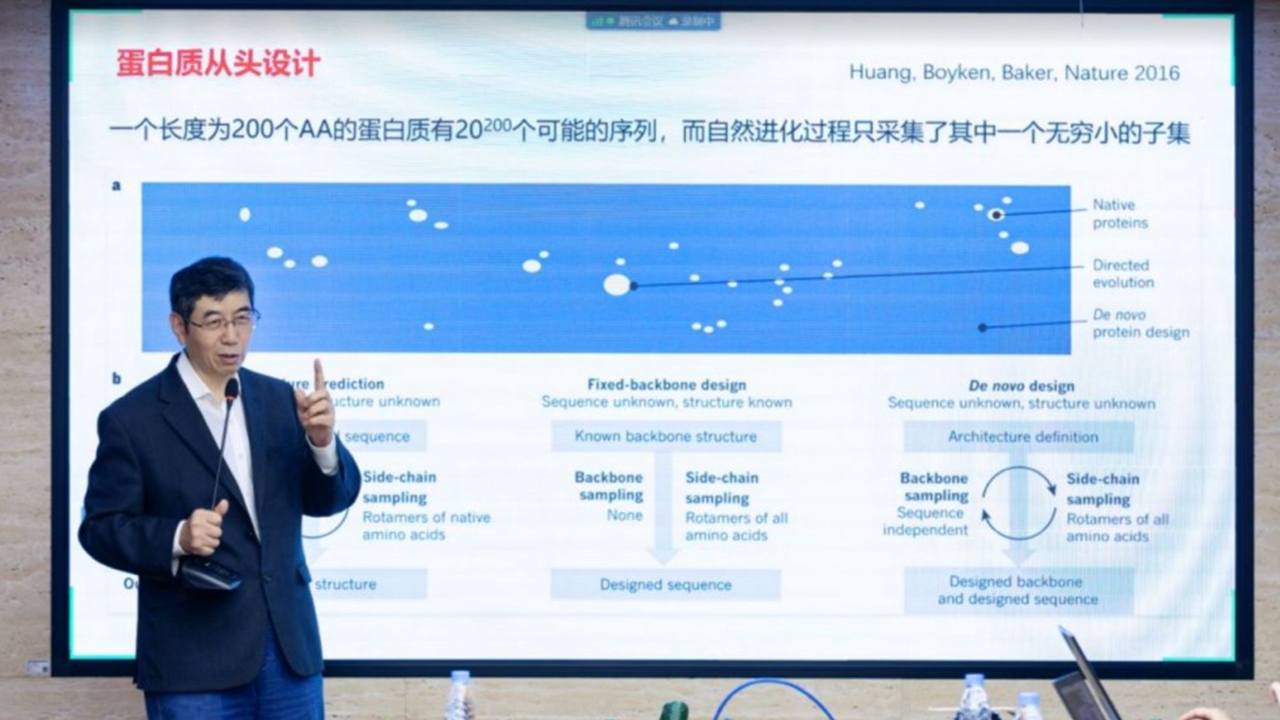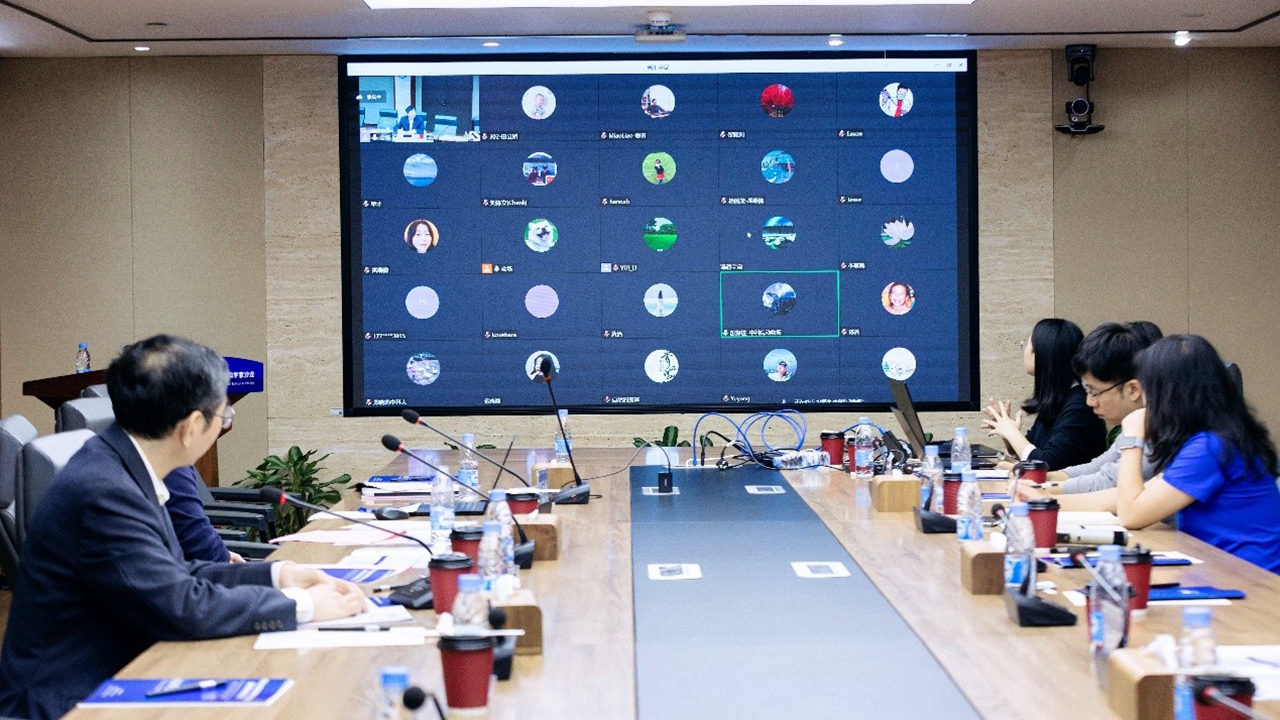Experts and researchers share insights on synthetic biology
Writer: | Editor: Liu Minxia | From: Guangming Convergence Media & Shenzhen Synthetic Biology Association | Updated: 2022-12-14
A+ A- Print

Experts and scientists take part in an online and offline forum on synthetic biology and related ethics and policy in Shenzhen on Dec. 1. Photos courtesy of Guangming Convergence Media & Shenzhen Synthetic Biology Association
A forum hosted by the China Association for Science and Technology (CAST) on synthetic biology and related ethics and policy, was held in Shenzhen from Dec. 1 to 2, 2022 both online and offline.
Synthetic biology is a frontier field of life science. It drives the development of biotechnology to a new level, and is also the core driving force for the development of an advanced bio-economy. The high-quality development of frontiers in biotechnology and the bioindustry should be supported by policies and laws.
To facilitate the high-quality development of international science and technology and the industry of synthetic biology, more than 40 experts and young scientists, including four from the United States and 11 from the Hong Kong and Macao special administrative regions (SARs), gathered together and discussed innovations in synthetic biology, industrial development, ethics and regulations, biosafety and the further development of biosafety.
The forum aimed to develop strategies for the ethics of science and technology and regulations that match the development of China, establish the image of responsible science and technology innovation, and enhance China’s international influence in the field of synthetic biology.
The forum included three sessions: speeches by established experts, speeches by young researchers, and a discussion on the innovative development of synthetic biology.
In the speeches given by established experts, two researchers respectively talked about synthetic biology and the ethics of the field, and four shared ideas about the trends of science and technology, synthetic biology and carbon neutrality, synthetic biology and law, and synthetic biology and biosafety.
In the speeches given by young researchers, six young scholars shared their views on science and technology, ethics, philosophy and communication.
The discussion session focused on an initiative for the innovative development of synthetic biology.
Liu Chenli, vice president of the Shenzhen Institute of Advanced Technology (SIAT), Chinese Academy of Sciences (CAS), gave an overview of the development of synthetic biology and pointed out the importance of simultaneous research on policies, ethics, regulations, think-tank strategies and science communication.
Jia Bo, senior affairs director of the secretariat of the Alliance of International Science Organizations (ANSO), introduced ANSO, an organization committed to promoting the development of and cooperation in international science and technology innovation. ANSO will also promote cooperation in the innovative development and application of synthetic biology between countries and regions along the Belt and Road.

Zhang Xian'en, honorary dean of Faculty of Synthetic Biology of SIAT and vice president of the Chinese Society of Biotechnology, delivers a speech.
Zhang Xian’en, honorary dean of Faculty of Synthetic Biology of SIAT and vice president of the Chinese Society of Biotechnology, gave a systematic introduction to synthetic biology and its development, and the technology roadmaps of different countries, and discussed the opportunities and challenges of synthetic biology.
Li Zhenzhen, a researcher of the Institutes of Science and Developmentof CAS, gave a detailed description of synthetic biology from the perspective of scientific ethics, pointing out that modern science and technology, social changes, scientific research and commercial applications are all closely linked. He explained that the dual goals of science shape the new relationship between science and ethics, and analyzes the innovative development strategies of synthetic biology from the ethical dimension.
Yang Guoliang, another researcher from the Institutes of Science and Development of CAS, discussed the trends of frontier science and technology from the aspects of digital technology leadership, the reform of the science and technology system, issues related to science and technology governance, and the current competition in science and technology.
Xia Lin, founder of Powered Carbon and associate researcher of SIAT, detailed the “carbon peaking and carbon neutrality” solution for empowering the synthetic biology industry.
Du Li, associate professor of the Faculty of Law, University of Macao, shared the legal norms and regulatory strategies for the development and commercialization of synthetic biology.
Peng Yaojin, researcher of the Institute of Zoology of CAS, talked about biosafety and prevention strategies.

Experts and scientists take part in an online and offline forum on synthetic biology and related ethics and policy in Shenzhen on Dec. 1.
In the young scientists’ speeches session, six young scholars shared their views on science and technology, ethics, philosophy and communication.
Guo Haotian, founder and CEO of Ailurus, shared the latest information about artificial cell synthesis and the future application scenarios of the technology.
Ou Yakun, associate professor from the Huazhong University of Science and Technology, talked about ethical issues and policy responses to synthetic biology.
Emily Huang from the University of Macao gave a talk on the “emergence” of biological functions from the perspective of Institutional Theory based on her research in philosophy.
Ma Shiwen from Soochow University shared the two dimensions of the metaphor of synthetic biology and explored the uncertainty of science from a philosophical perspective.
Yi Xiao, researcher of SIAT, introduced the characteristics and influences of scientific communication in the field of synthetic biology.
Bao Yuhan, associate director of the Youth Working Group of Synthetic Biology Branch of Chinese Society of Biotechnology, shared the necessity and significance of responsible innovation.
During the final session, the participants discussed ways young scientists can support the innovative development of synthetic biology. The discussion focused on the technological and industrial development of synthetic biology. Initial agreements were reached in terms of technological innovation, industrial empowerment, ethical responsibility, legal responsibility and social responsibility.
This event set up a cross-boundary exchange platform for young talents in the fields of synthetic biology, industry, policy, ethics and regulations, think-tank research, media communication and other fields.
Fu Xiongfei, principal investigator and deputy director of the Institute of Synthetic Biology, SIAT, and vice-chairman of Shenzhen Synthetic Biology Association, is the executive chairman of this event. Lei Ruipeng, executive director of the Center for Bioethics, Huazhong University of Science and Technology, is the co-host.
The forum was hosted by the China Association for Science and Technology, organized by Shenzhen Synthetic Biology Association, and co-organized by multiple organizations including the Alliance of International Science Organizations, Asian Synthetic Biology Association, Youth Working Group of Synthetic Biology Branch of Chinese Society of Biotechnology, Think Tank Professional Committee of Chinese Association of Development Strategy Studies, Faculty of Synthetic Biology, Institute of Synthetic Biology of SIAT, and the Shenzhen Institute of Synthetic Biology, among others.